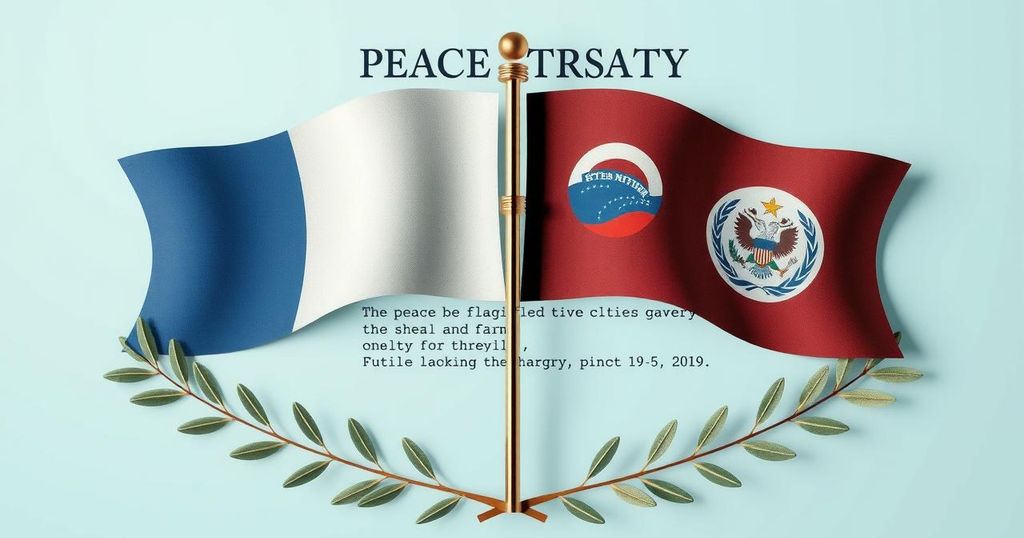World news
AP, ASIA, BLACK SEA, DONALD TRUMP, EUROPE, EUROPE/ASIA, INTERNATIONAL RELATIONS, KR, KREMLIN, KURSK, KYIV, MILITARY, MILITARY SUPPORT, MOSCOW, NEGOTIATORS, NORTH AMERICA, PEACE NEGOTIATIONS, PUTIN, RIA - NOVOSTI, RIYADH, RUSSIA, RUSSIA-UKRAINE WAR, SAUDI ARABIA, SUDZHA, TASS, TRUMP, U. S, UKRAINE, UNITED STATES, US, WAR, WHITE HOUSE, ZELENSKYY
David O'Sullivan
0 Comments
Negotiators from U.S. and Russia Pursue Ceasefire Discussions in Saudi Arabia
U.S. and Russian negotiators are discussing a partial ceasefire in Ukraine in Riyadh, following preliminary agreement after talks between Presidents Trump and Putin. The agenda includes protections for energy and civilian infrastructure amid ongoing attacks. Negotiations are complicated by differing interpretations of the ceasefire terms and continued violence.
On Monday, U.S. and Russian negotiators convened in Saudi Arabia to discuss a potential partial ceasefire in Ukraine. This meeting occurred shortly after discussions between U.S. and Ukrainian delegations, as reported by Russian news outlets. The negotiations, taking place in Riyadh, are expected to be followed by further interactions between the U.S. and Ukraine teams.
Discussions are focused on implementing a pause in long-range attacks by both nations targeting energy facilities and civilian infrastructure, as well as ceasing attacks in the Black Sea to ensure safe commercial shipping. Both Ukraine and Russia reached a preliminary agreement on a limited ceasefire after U.S. President Donald Trump’s discussions with the leaders of the two nations.
However, differing perspectives have emerged regarding de-escalation targets, with each side accusing the other of sabotaging ceasefire efforts. While the White House indicated that “energy and infrastructure” would be protected, the Kremlin’s interpretation limited the agreement to only “energy infrastructure.” Ukrainian President Volodymyr Zelenskyy expressed the need for broader protections including railways and ports.
Following talks, Kremlin spokesperson Dmitry Peskov clarified that the ceasefire agreement with Trump focused solely on energy facilities. He accused Ukraine of violating the agreement by launching an attack on a gas metering station in Russia, which Ukraine’s military denied, attributing the assault to Russian forces. The conflict continued as Russia conducted drone attacks in Ukraine, leading to civilian casualties.
In a televised statement, President Zelenskyy emphasized that an unconditional ceasefire proposal has been on the table for an extended period, attributing ongoing attacks to Russia’s refusal to stop. He urged for increased pressure on Russia to cease hostilities, citing the need for global support from nations like the U.S. and Europe.
Zelenskyy has indicated Ukraine’s willingness to accept a full 30-day ceasefire, while President Putin conditioned a comprehensive ceasefire upon halting arms supplies to Ukraine and suspending military mobilization, conditions that Ukraine and its allies have rejected. Special envoy Steve Witkoff expressed optimism about the negotiations in Saudi Arabia’s potential progress toward a ceasefire in the Black Sea.
In parallel, U.S. and Ukrainian representatives engaged in technical-level discussions in Riyadh, with participation from military, energy, and diplomatic officials from Ukraine. Zelenskyy noted the constructive nature of the talks while reiterating the imperative for Russia to genuinely commit to stopping attacks. He remarked on the need for accountability on the part of the aggressor.
Moreover, the Ukrainian state railway operator faced a cyber attack on its online services, which the company announced did not disrupt train operations despite the ongoing cyber threats. Ukrainian air force reports indicated significant drone activity from Russia, with numerous drones targeted and some causing damage and injuries in various regions, evidencing the sustained conflict despite ongoing diplomatic efforts.
In summary, U.S. and Russian negotiators are engaged in critical ceasefire discussions in Saudi Arabia to address ongoing conflict in Ukraine. Divergent interpretations of the ceasefire agreement highlight the complexities of the situation. The international community’s support remains crucial in urging Russia to cease military actions, as both sides contend with continuing hostilities. The outcome of these negotiations could have significant implications for regional stability and the humanitarian situation in Ukraine.
Original Source: www.usnews.com




Post Comment